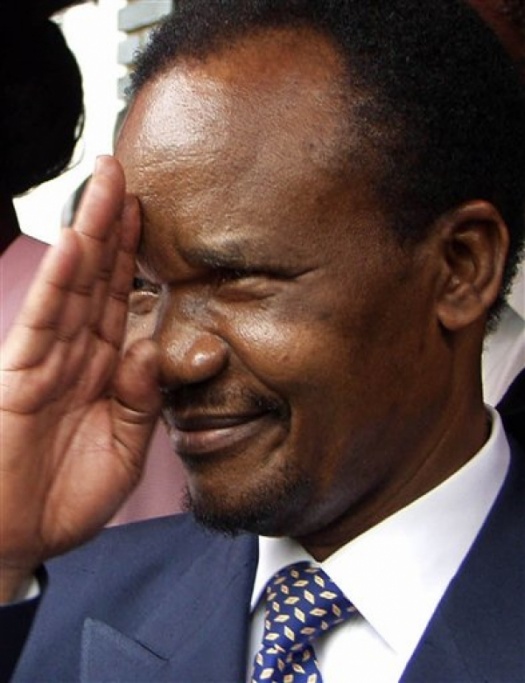
LUSAKA, Zambia — Capping a six-year trial, former Zambian President Frederick Chiluba was cleared of corruption charges Monday because of lack of evidence in a ruling that left his supporters jubilant but clean-government campaigners in Africa frust
LUSAKA, Zambia — Capping a six-year trial, former Zambian President Frederick Chiluba was cleared of corruption charges Monday because of lack of evidence in a ruling that left his supporters jubilant but clean-government campaigners in Africa frustrated. Chiluba, 63, was accused of diverting nearly $500,000 of state money into accounts to pay for an extravagant lifestyle when he served as Zambia’s first democratically elected leader from 1991 to 2001, but the judge ruled the funds could not be traced to government coffers. About 150 supporters in the courtroom broke into applause even before Magistrate Jones Chinyama finished reading the 3,400-word verdict. "After studying the evidence presented to this court, I’m left with no doubt that the prosecution failed to prove their case beyond a reasonable doubt," Chinyama said. Chiluba smiled and hugged his wife and other family members, then walked from the courthouse to his black Mercedes Benz as his supporters ran after him, singing and dancing. Chinyama found two co-defendants, former executives of a financial services company, guilty of receiving stolen money from the Zambian intelligence services. They were each sentenced to five years in jail. Auwal Musa Rafsanjani, a pro-democracy and anti-corruption campaigner in Nigeria, said he had anticipated a guilty verdict for the former president because several people close to Chiluba — including his wife — were convicted earlier on related charges. Rafsanjani said the verdict is "quite frustrating," and that it underscores how investigators and prosecutors in impoverished African countries often can’t compete with the legal firepower marshaled by leaders accused of corruption. "It’s a big concern for us in Africa and that’s one of the reasons why corrupt leaders are hardly (ever) punished," he said. "That’s the way it goes in many places in Africa. You just buy justice. That’s why many people have lost faith in courts in Africa." If convicted, Chiluba faced up to 15 years in jail. He had argued that he and his associates were targeted in a political witch hunt backed by the British, Zambia’s former colonial rulers. In March, Chiluba’s wife Regina was convicted of receiving $300,000 in cash and goods that prosecutors said the former president stole from his official residence and sentenced to 3 1/2 years hard labor. She is free pending an appeal. A leading Kenyan anti-graft campaigner, John Githongo, said he salutes "the authorities in Zambia for making this effort while knowing its challenges." "A small country undertaking a multi-jurisdictional case like this is important in and of itself," Githongo told The Associated Press. But Zambia needed help. When proceedings began in 2003, its courts were not equipped to handle the large volume of documents and evidence. Court transcription was still done by longhand. The U.S. Treasury Department provided technical assistance and other donor nations also helped. Chiluba’s prosecution was part of an anti-corruption campaign pushed by the late President Levy Mwanawasa, once Chiluba’s protege. Mwanawasa died last year at the age of 59 after a stroke. Mwanawasa’s vice president, Rupiah Banda, won election last October to complete the remaining three years in Mwanawasa’s five-year term. Under Mwanawasa, a stream of Chiluba’s close political, military and business aides have either been sent to jail already or are awaiting sentencing for abuse of office and theft. Banda had campaigned on promises to continue his predecessor’s policies. Zambian prosecutors had contended Chiluba diverted nearly $500,000 in public money, intended for debt servicing, into a fund from which he paid his children’s school fees and legal costs incurred during his re-election in 1996. A former trade unionist, Chiluba helped force an end to 27 years of one-party rule under Zambia’s first president, Kenneth Kaunda, in 1991 and became the country’s first democratically elected president. Chiluba named Mwanawasa his vice president after his 1991 victory. Mwanawasa soon quit the post, complaining of corruption. Zambian prosecutors won a major victory in 2007 in a London High Court civil case, when Judge Peter Smith ruled that Chiluba — who refused to attend the proceedings — was guilty of stealing $46 million from Zambian state coffers during his 10 years in office. Zambian prosecutors had pursued the case in British courts because some of the money was allegedly laundered through British banks. Smith ordered Chiluba to pay back 85 percent of the money, and in his ruling painted a picture of a decadent ruler who spent taxpayer funds on expensive suits and shoes while most Zambians lived in poverty. Chiluba has appealed and has not made any repayments. Associated Press writers Donna Bryson in Johannesburg and Tom Maliti in Nairobi, Kenya contributed to this report. ______ In photo: FILE – Former Zambian President Frederick Chiluba, leaves the Chikwa magistrate court in Lusaka, Zambia, in this Monday, Feb. 16, 2004, file photo. (AP Photo/Salim Henry, File) Copyright 2009 Associated Press. All rights reserved. This material may not be published, broadcast, rewritten, or redistributed.